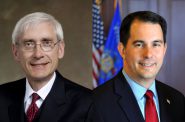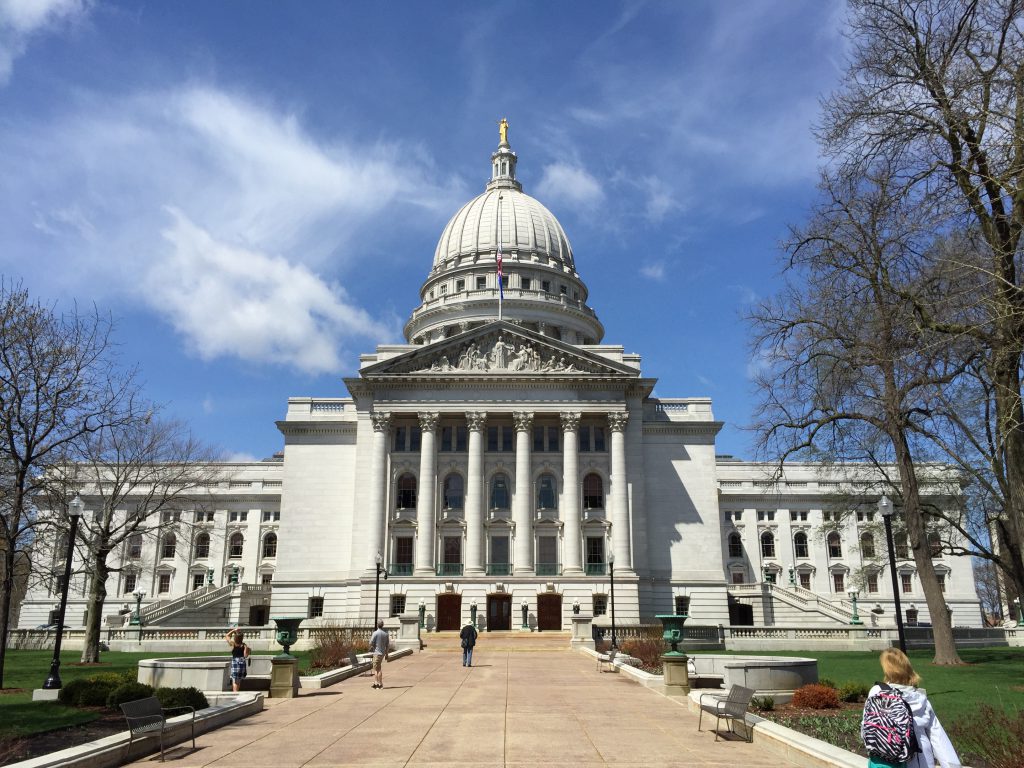Democrats Make Closing Arguments
Lively gubernatorial debate covered topics from Gov. Walker's worst action to cutting the state's prison population.
Seven of the eight Democrats running for governor got asked a little bit of everything in a fast-paced debate Wednesday night in front of a lively crowd at the Madison Public Library.
From their views on Republican Gov. Scott Walker‘s biggest failure, to their second-favorite choice for governor, all seven made closing pitches to voters less than a week before the primary.
Those participating were state Superintendent of Public Instruction Tony Evers, Milwaukee attorney Matt Flynn, activist Mike McCabe, Kenosha native Josh Pade, former Madison state Rep. Kelda Roys, Madison Mayor Paul Soglin and state Sen. Kathleen Vinehout. State firefighter union head Mahlon Mitchell‘s campaign said he was traveling and did not attend.
The crowd was engaged, sometimes laughing or applauding at the candidates’ answers and gasping with surprise at some of the “lighting round” questions.
The debate was organized by the Madison weekly Isthmus, The Progressive magazine, and WORT-FM radio.
Worst Thing Walker Has Done?
All seven candidates were asked to name — in one sentence sentence — the worst thing Walker has done as governor.
“When he said, ‘I’m the education governor,'” said Evers, referring to Walker’s re-election campaign strategy in 2018.
“His best and worst decision was to run for president,” said Roys. “Because it showed us that he never cared about us … and it showed the country what a terrible leader he is.”
Vinehout listed Walker’s first budget in 2011.
“He cut veterans programs, he cut school milk, he cut school breakfast,” Vinehout said. “An unbelievable number of people were hurt by that first budget.”
“His desire to divide and conquer people and pit one population of people in Wisconsin against other people,” said McCabe.
Flynn said it was Walker’s decision to go into politics in the first place, Soglin said it was thinking he could submit a budget that’s in the peoples’ best interest, while Pade cited Walker’s “selling out” Wisconsin to the conservative Koch brothers.
Potential Primary, General Election Weaknesses
The candidates were also asked about their own potential weaknesses, and in one instance, Flynn and Evers sparred.
“If we nominate somebody, a good person, who praised (Walker’s) education budget … that’s not a contrast,” Flynn said. “It gives the appearance of ‘Republican-light.'”
Flynn was referencing comments Evers made in February 2017 praising Walker’s education budget, which would have increased state spending on schools by nearly $650 million.
Evers shot back.
“I need to respond to that cheap shot,” Evers said. “My budget was absolutely pro-kid. And the reason I said that was because Scott Walker adopted that budget, almost 90 percent of it.”
“I made a mistake in that race,” she said. “I had disagreements with him that were policy disagreements, but they were minor in the grand scheme of things.”
Soglin was asked about his combative rhetorical style and how he could defend it.
“One of the things that’s marked my political career is refusing to share in what some folks call a professional courtesy to other politicians,” Soglin said.
Vinehout was asked about her 2009 vote against two people appointed to the UW Hospital and Clinics Authority Board who had supported a proposal to offer late-term abortions at the Madison surgery clinic. Pressed on why she voted against them, she didn’t have an answer.
“A long time has elapsed,” Vinehout said. “I’ve taken thousands of votes on appointments.”
Flynn was also pressed on his work representing victims of priest abuse as a lawyer for the Archdiocese of Milwaukee.
Taxes To Fund Education?
Soglin has said during this campaign that he would increase taxes to pay for schools. The other candidates were asked whether they would, too.
Most were hesitant.
“It’s a question of priorities,” said Vinehout. “Do we have the money? Yes, we have the money. But we can’t spend $464 million on Foxconn’s first budget payment. The money is there, but we need to rearrange the priorities.”
“Yes, we need more money for our public schools,” said Evers. “But whether it’s tax increases or looking at tax credits we give out to the very, very wealthy people in the state, we have to look at all the issues. The only thing cannot be just a tax hike.”
Flynn said he’d end the Foxconn deal, take federal money for the expansion of Medicaid and get rid of the manufacturers and agriculture tax exemption.
“That’s where the money is going to come from for public education,” he said. “Not from raised taxes.”
McCabe said he’d end private school vouchers and spend that money on public schools instead.
“Wisconsin’s been trying to fund two separate and parallel systems of education and hasn’t been doing justice by one,” McCabe said. “I favor ending taxpayer subsidized private schooling which has siphoned resources away from public schools.”
Pade said the state could find education money by reducing the prison population. Roys called for ending tax credits for people who don’t need them.
When it was Soglin’s turn, he chided his Democratic opponents.
“Let’s cut the crap,” Soglin said. “If you’re going to spend more money on schools, you’ve got to spend more tax money. That’s all there is to it.”
Cutting State Prison Population
All the candidates chimed in on a question about cutting the state’s prison population by half, an idea many of them have endorsed.
Walker has attacked Democrats for their stance, saying it would let violent offenders back on the street.
All seven Democrats pushed back.
“All you have to look across the border to the west and there’s Minnesota, which imprisons half as many people as Wisconsin,” said McCabe.
Vinehout questioned the state Department of Corrections‘ data on violent offenders.
“We don’t know how those books are cooked,” she said. “And until I see the data and until I see exactly where that information is coming from, I don’t believe it.”
Evers attacked Walker for saying he sees no value in visiting prisons.
“We have thousands and thousands of people working in the system, lots of people incarcerated,” Evers said. “The governor has to be there, he has to talk to these people.”
Flynn said he would pardon anybody in prison arrested for a nonviolent marijuana offense. Pade said he’d stop the “pipeline to prison.”
“And that begins with holding all of our prosecutors accountable for how they’re conducting their job,” Pade added.
If Not You, Who?
The biggest reaction from the crowd Wednesday night came when candidates were asked who they would vote for if they were not on the ballot.
McCabe chose Vinehout, referencing her western Wisconsin roots.
“Kathleen understands that we can’t get a new governor without winning in places outside of Madison and Milwaukee,” McCabe said.
Evers also picked Vinehout, and Vinehout picked Evers.
“I’ve been Tony’s fan for a long time,” Vinehout said.
Pade, who is 38, chose Roys, who is 39.
“We need a new generation of leaders stepping up,” Pade said.
Flynn chose Soglin. So did Roys.
“Because I think it would be really fun to watch,” Roys said.
But Soglin threw a twist into the voting.
“If I was not on the ballot,” said the Madison mayor, “I would write in myself.”
Listen to the WPR report here.
Democrats Make Closing Arguments In Lively Gubernatorial Debate, Who was originally published by Wisconsin Public Radio.
Race for Governor
-
Last of the Republican Upstarts
 Nov 5th, 2018 by Shawn Johnson
Nov 5th, 2018 by Shawn Johnson
-
Walker, Evers Differ on Gun Laws
 Oct 30th, 2018 by Laurel White
Oct 30th, 2018 by Laurel White
-
Evers Questions Foxconn Air Quality
 Oct 29th, 2018 by Sarah Whites-Koditschek
Oct 29th, 2018 by Sarah Whites-Koditschek





















